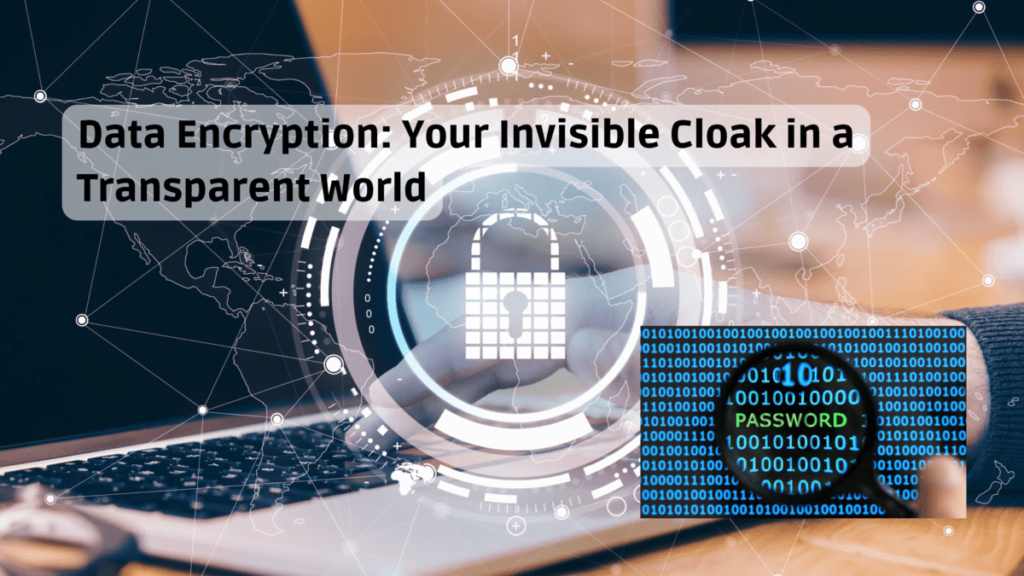Imagine stepping into a bustling marketplace, but instead of tangible goods, the wares being traded are your most personal information. Names, addresses, financial details, medical records—everything that makes you, you, floats freely in the air, vulnerable to any passerby with prying eyes. This, unfortunately, is not far from the reality of our digital world. But just like we wouldn’t parade through a marketplace naked, there’s a powerful tool to safeguard our digital data: data encryption.
Think of data encryption as your invisible cloak in this transparent world. It transforms your plain text – your personal and sensitive information – into a scrambled code, an unintelligible cipher accessible only to those with the right key. This means even if your data gets intercepted, it remains locked away, a meaningless jumble to unauthorized parties.
READ: Crackproof Passwords: Build Your Digital Fortress in Today’s Age
Why is data encryption so important?
In today’s data-driven world, the potential consequences of unencrypted data are severe:
- Identity theft: Exposed personal information like names, addresses, and Social Security numbers can be used for fraudulent activities, leading to financial losses and damaged credit scores.
- Financial fraud: Unencrypted passwords, credit card details, and bank account information can be stolen, leaving your finances vulnerable to unauthorized access and depletion.
- Privacy violations: Private messages, medical records, and other sensitive data can be exposed, impacting your privacy and potentially causing emotional distress.
- Business disruptions: Data breaches in companies can lead to operational disruptions, reputational damage, and financial losses.
Data encryption: Your digital shield
Data encryption comes in various forms, each offering a unique level of protection:
- Symmetric encryption: Uses a single key for both encryption and decryption, making it efficient but requiring careful key management.
- Asymmetric encryption: Uses two keys – a public key for encryption and a private key for decryption – offering enhanced security for sensitive data transmission.
- Hashing: Creates a unique digital fingerprint of your data, ensuring its integrity and helping detect any unauthorized modifications.
READ: Why Two-Factor Authentication is Needed in Today’s Digital Age
Who needs data encryption?
Everyone! While businesses have a clear responsibility to protect customer data, individuals also benefit greatly from encrypting their personal information. This includes:
- Encryting your hard drive: This protects your personal files like photos, documents, and financial records from unauthorized access if your device is stolen or lost.
- Using encrypted messaging apps: Securely communicate with colleagues and loved ones without worrying about prying eyes.
- Enabling HTTPS everywhere: Encrypts your web traffic, protecting your browsing activity and login credentials from eavesdropping.
- Using VPNs for public Wi-Fi: Creates a secure tunnel for your online activity when using public Wi-Fi networks, shielding your data from potential snoopers.
Building a culture of data encryption:
Making data encryption a standard practice requires a collective effort:
- Individuals: Implement the tips mentioned above and advocate for stronger data protection practices.
- Businesses: Invest in robust encryption solutions, prioritize data security training for employees, and be transparent about their data protection policies.
- Governments: Enact strong data privacy regulations and promote awareness about the importance of data encryption.
Data encryption: An investment in your digital future
In an increasingly interconnected world, data encryption is no longer a luxury, but a necessity. It’s your invisible cloak in a transparent world, protecting your privacy, finances, and peace of mind. By embracing data encryption and advocating for its broader adoption, we can collectively create a digital landscape where privacy is respected, security prevails, and trust flourishes.
Let’s build a future where our information is not readily available for all to see, but instead remains securely encrypted, guarded by the invisible cloak of data protection.
Additional Resources:
- National Institute of Standards and Technology (NIST): https://csrc.nist.gov/: https://csrc.nist.gov/
- Cybersecurity & Infrastructure Security Agency (CISA): https://www.cisa.gov/: https://www.cisa.gov/
- Electronic Frontier Foundation (EFF): https://www.eff.org/: https://www.eff.org/
- National Cybersecurity Alliance: https://staysafeonline.org/: https://staysafeonline.org/
Remember, data encryption is powerful, but its effectiveness depends on awareness and adoption. Share this article and encourage others to take control of their data and embrace the protection offered by this invisible cloak in the digital world.

